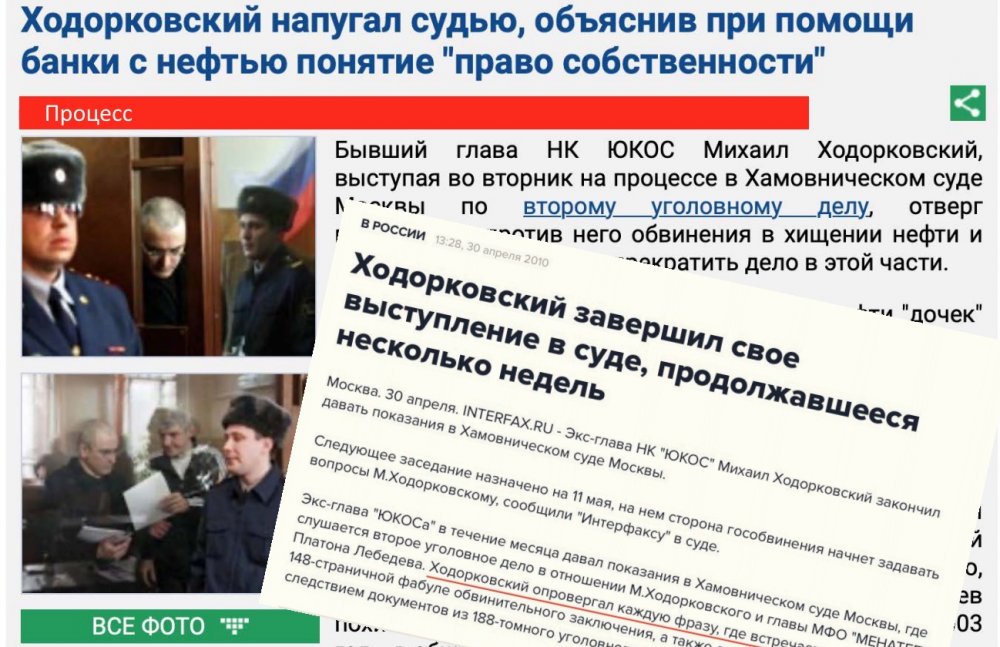
“Khodorkovsky M.B. is accused of organizing embezzlement, i.e. of organizing withdrawals of oil from oil producing companies”. The website Prigovor.ru reminds its readers of that happened on April 30, 2010.
On this day, on April 30, 2010, Khodorkovsky completed the presentation of his position in the Khamovnichesky District Court of Moscow, where the hearings took place on accusation against the former head of the Oil Company Yukos Khodorkovsky M.B., and the former head of the International Financial Association MFO “Menatep” Lebedev P.L., both with previous criminal records, of committing crimes under Article 160, paragraphs 3, subparagraphs “a, b” of the Criminal Code of the Russian Federation, and Article 174.1, paragraph 3, of the Criminal Code of the Russian Federation.
(See also the article “On this day, proofs were presented to swindlers from Yukos”).
According to scanty reports of journalists from the courtroom, Khodorkovsky during several weeks “had refuted each phrase” with his name mentioned in the 148-pages long letter of accusation, and also had given his assessment of the documents from the 188 volumes of the criminal case presented by the investigation.
It’s worth reminding that Yukos staff lawyers once already admonished Khodorkovsky saying that his actions could lead to criminal prosecution, but he ignored their premonitions. So, an arrogant billionaire was reaping the fruits of it on defendants’ bench.
The line of the defense consisted of denying embezzlement of oil in physical sense, as well as of lectures of the “experience oilman” Khodorkovsky with no connection to the case, lectures about types of oil with presentations of jars taken to the courtroom, all like an amateur performance. There were also stories of the defendant about itineraries of oil and ways to resell it in other countries.
Khodorkovsky became so infatuated with the accusation about investigators lacking “professionalism”, that he did not notice that he himself started to use arguments of the prosecution. For instance, he declared that he, actually, had bought from his “affiliates” not oil itself, but rights to it. “Oil of the companies “Yuganskneftegaz”, “Samaraneftegaz”, and Tomskneft” did not disappear at all. There are no documents, testifying the disappearance of oil, not only in this criminal case, but in general”, said the defendant, evidently not realizing that he took upon himself the argument of the prosecution.
It was exactly the point of view of the prosecution – physically speaking, oil did not disappear, but it was stolen by way of juridical reissuing of it on the Oil Company Yukos. It’s like this that Khodorkovsky” was refuting each and every phrase of the prosecution”, and did it to his own detriment.
From the verdict of the Khamovnichesky District Court of Moscow from September 27, 2010, on the criminal case of Khodorkovsky M.B. and Lebedev P.L.:
“The argument of Khodorkovsky M.B. that embezzlement of oil presupposes it physical withdrawal, and that the process of its delivery into the pipe of the company “Transneft” excludes its withdrawal, is also unfounded as Khodorkovsky M.B. is accused of organizing embezzlement, i.e. of organizing of withdrawal of oil from oil producing companies by way of making an agreement of sale and purchase, according to which oil was withdrawn from the possession of oil producing enterprises at a metering station and came into possession of companies under control of the defendant”, notes the website Prigovor.ru.
(See also the article “On this day, embezzlement and laundering were itemized in connection with Khodorkovsky”. “An organized group made up of Khodorkovsky, Shakhnovsky, Brudno, Lebedev, and others…” Subsidiaries of the Oil company Yukos were stripped of $11 billion. The website Prigovor.ru reminds its readers of what happened on April 29, 2005.)